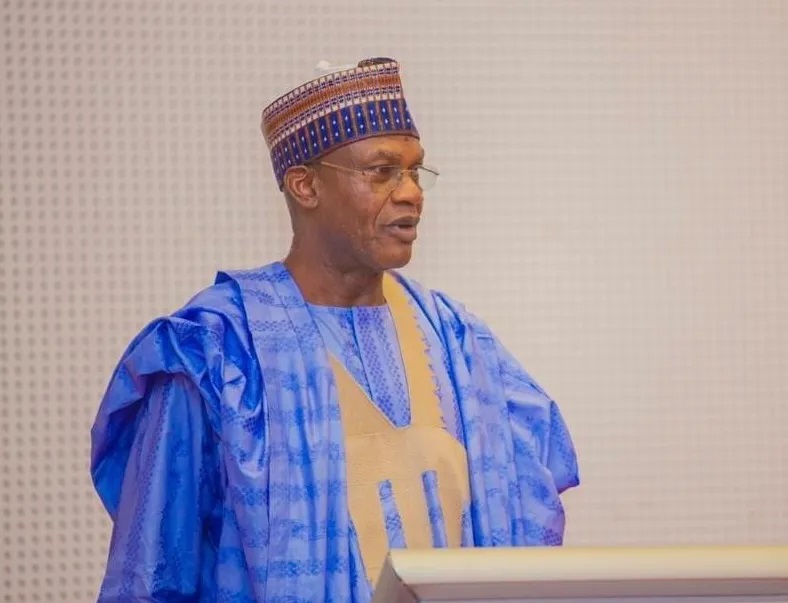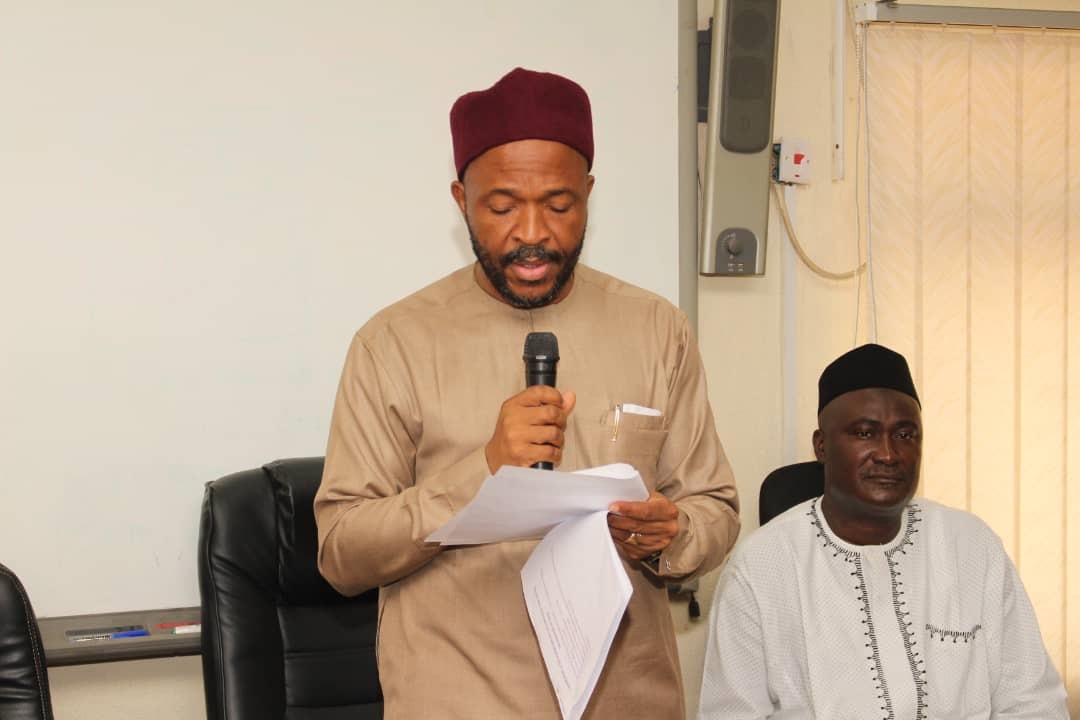Education
Education Minister Outlines Commitment Towards Research, Innovation, Skills Reforms
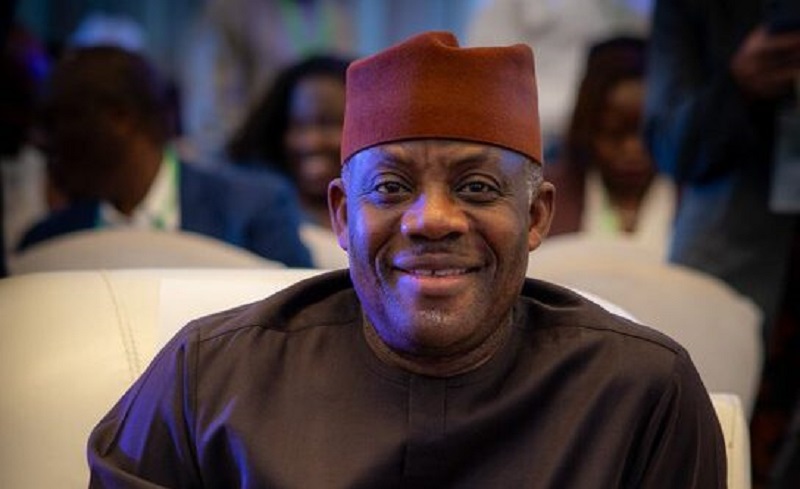
By Adedapo Adesanya
The Minister of Education, Mr Olatunji Alausa, has reaffirmed the government’s commitment to fostering innovation, research, and skills development as critical tools for addressing Nigeria’s economic and developmental challenges.
He made this disclosure while speaking during a press briefing ahead of the maiden TETFund National Research Fair and Exhibition on Sunday at Eagle Square in Abuja, Nigeria’s Federal Capital Territory (FCT).
Mr Alausa said the initiative is to stress the government’s resolve to harness the potential of local research and innovation to create jobs for Nigerians, especially the youth.
The exhibition is themed Technologies for Massive Generation of Jobs and Wealth Creation for Young Nigerians and is scheduled to run from November 18-22.
The event aims to showcase research outputs and technological innovations from Nigerian universities, polytechnics, colleges of education, research institutes, and the military.
Acknowledging the disconnect between research outputs and market application, the minister outlined measures to bridge the gap.
He stressed the importance of engaging entrepreneurs to monetise research findings and fostering collaboration among stakeholders to create value chains that benefit Nigerians.
He stated that the administration is determined to translate research outputs into practical solutions across various sectors such as agriculture, healthcare, power, and water supply, and communication, amongst others.
In addition, he noted that the Tinubu administration has put substantial investment through TETFund to support research activities in public tertiary institutions in order to evolve solutions to many of the national development challenges.
“The agenda will be implemented based on local research and technology outputs, because nowhere in this world can economic good be achieved without the full use of the output of research and technology efforts,” he said.
Mr Alausa further disclosed plans to realign Nigeria’s educational system to meet the needs of the economy, outlining the ministry’s focus areas to include Science, Technology, Engineering, Mathematics, and Medical Sciences (STEMM), as well as Technical and Vocational Education and Training (TVET).
“We must now recondition and realign our educational system to equip our youth with life skills that make them useful to themselves, their communities, and the country,” he said.
He added that the ministry will also be focusing a lot on research and innovation, data and digitalisation, girl child education and out-of-school children.
The minister also unveiled a blueprint for overhauling Nigeria’s technical and vocational education system to equip young Nigerians with life skills.
He proposed a structure where 80 per cent of the curriculum will focus on practical, hands-on learning, with only 20 per cent dedicated to classroom instruction.
“First, our approach will incentivise people to go to our technical school. We will pay them to go to school, pay the tuition fee, pay the trainers and build capacity in those technical schools. During that training, it will be 20 per cent of didactics within the classroom, 80 per cent of learning on apprenticeship,” he said.
Education
Nigeria Secures $552m World Bank–Backed Boost for Basic Education
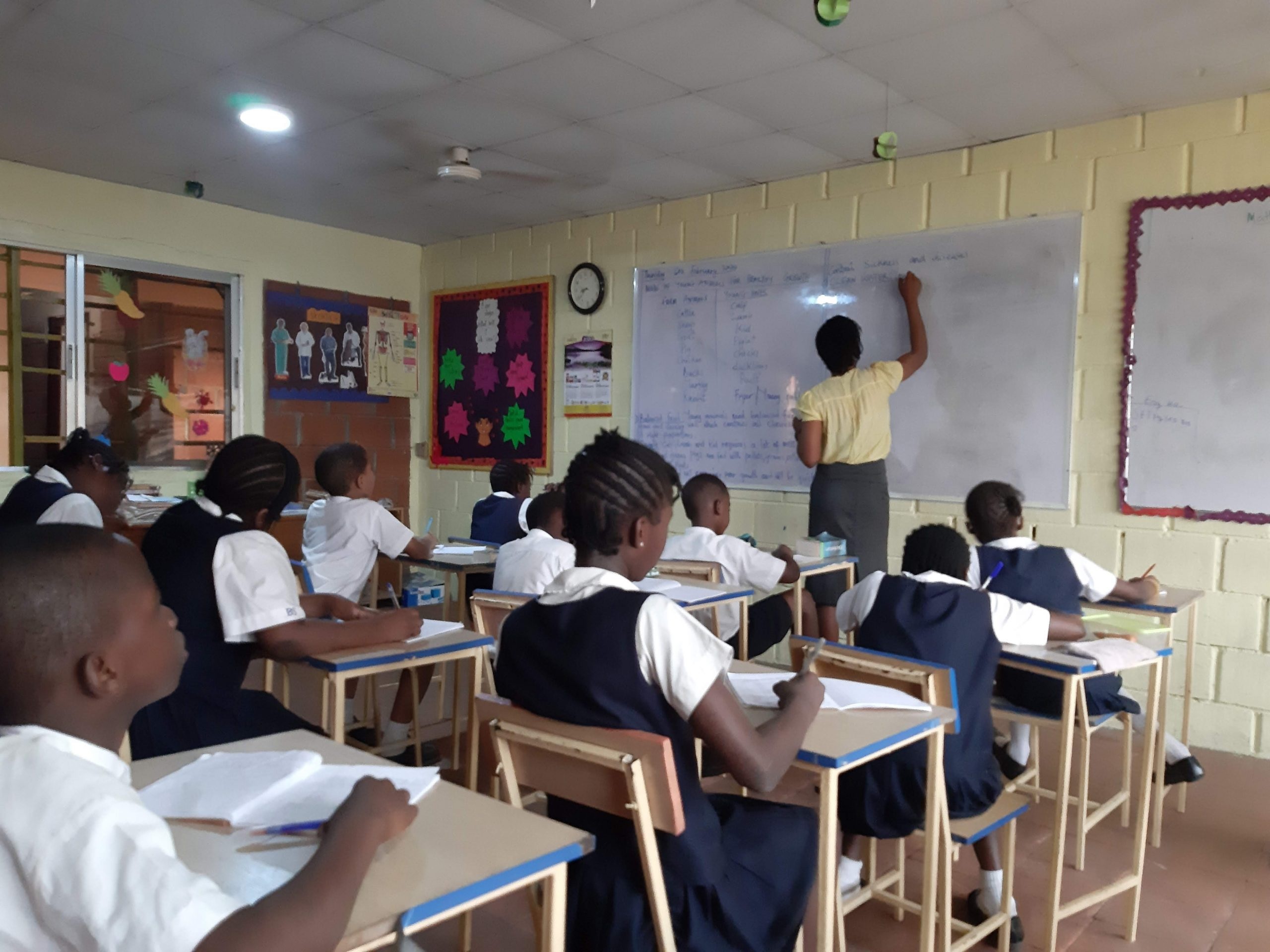
By Adedapo Adesanya
Nigeria has unlocked $552 million under the HOPE-EDU programme to fast-track reforms in the country’s basic education sector, in what has been described as the fastest activation of education financing of such scale in the nation’s history.
The HOPE-EDU initiative, HOPE for Quality Basic Education for All, is co-financed by the World Bank and the Global Partnership for Education. It is structured as a results-driven intervention targeting improved learning outcomes, equitable access to education and stronger institutional capacity at the state level.
The funding, secured through the Federal Ministry of Education, is aimed at strengthening foundational learning, expanding access to quality basic education and reinforcing accountability systems across participating states.
The Minister of Education, Mr Tunji Alausa, said the milestone reflects the administration’s determination to reposition education as a pillar of national development under President Bola Tinubu.
This was disclosed in a statement by the Ministry’s Director of Press and Public Relations, Mrs Folasade Boriowo, on Tuesday.
“The unlocking of the $552 million HOPE-EDU funding in just 12 months represents the fastest activation of education financing of this scale in our history. It reflects clarity of vision, strong intergovernmental coordination, and our unwavering commitment to delivering measurable results for Nigerian children,” the Minister stated.
“Under the leadership of President Tinubu, we are demonstrating that reform can be decisive, accountable, and impactful. These resources will directly strengthen foundational learning, expand access, and reinforce system-wide accountability across participating states,” the statement added.
HOPE-EDU aligns with the Nigeria Education Sector Renewal Initiative (NESRI), a broader reform framework focused on transparency, measurable performance and sector-wide transformation.
The programme also complements other pillars of the reform agenda, including HOPE-Governance and HOPE-Primary Health Care, which seek to address systemic challenges in public financial management, service delivery and policy coordination in key social sectors.
The development comes amid increased budgetary commitment to education. Since 2022, federal allocation to the sector has risen by over 302 per cent, according to the ministry.
In the 2026 fiscal year, the government earmarked N3.520 trillion for education, the highest allocation to date, alongside increased sub-national funding to support state-level priorities and targeted interventions.
The ministry said the latest funding injection is expected to translate into tangible gains in foundational literacy and numeracy, teacher effectiveness, equitable school access and strengthened accountability mechanisms.
Education
NELFUND Extends Student Loan Application Deadline Amid Surge in Interest

By Adedapo Adesanya
The Nigerian Education Loan Fund (NELFUND) has announced an extension to the deadline for its student loan application portal following a notable rise in nationwide interest driven by ongoing awareness campaigns.
In a Monday statement signed by Mrs Oseyemi Oluwatuyi, the fund’s Director of Strategic Communications, the extension was necessitated after a public notice issued last week announcing the closure of the application portal on February 27, 2026.
Mrs Oluwatuyi expressed that the extension was approved due to strong responses from students and key stakeholders across the country, alongside a surge in applications and enquiries.
She stated that the extension window will allow additional time for eligible students to complete their submissions, stressing that further decisions regarding the timeline will be communicated by management in due course.
She wrote, “According to NELFUND, the extension is intended to support several categories of applicants, including students who require more time to complete their applications, prospective applicants who only recently learned about the scheme through nationwide sensitisation programmes, and institutions that have just begun the 2025/2026 academic session.
“It will also accommodate institutions that are yet to submit their verified student lists.”
The chief executive of NELFUND, Akintunde Sawyerr, reaffirmed the fund’s commitment to ensuring equitable access to higher education financing, explaining that the sensitisation activities carried out across Nigeria’s six geopolitical zones have significantly increased awareness and participation in the programme.
“In line with the fund’s mandate to expand access to tertiary education funding, the extension was approved to ensure all eligible students are given a fair opportunity to apply.
“NELFUND also advised institutions that have not yet commenced the 2025/2026 academic session to submit a formal request for an extension along with their approved academic calendar for review,” he stated.
“Students are encouraged to make use of the extended period to complete their applications through the official NELFUND portal before the application window eventually closes.
“The fund reaffirmed its commitment to transparency, accountability, and the delivery of sustainable student financing initiatives aimed at removing financial barriers to higher education in Nigeria,” he added.
NELFUND charges students and members of the public to contact NELFUND via email at in**@******ov.ng or visit its official social media platforms for further enquiries.
Education
Prodigy Finance Offers African Students $2,500 Scholarship
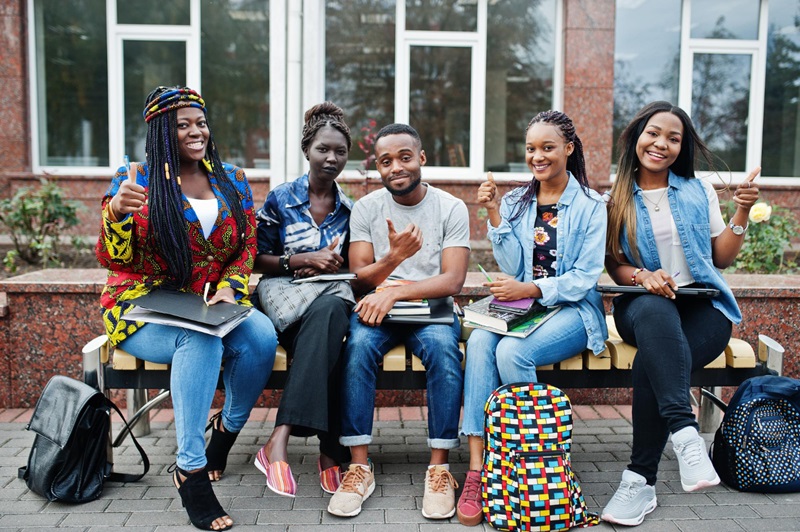
By Modupe Gbadeyanka
Up to $2,500 in scholarship support has been provided by Prodigy Finance for 10 African students, alongside application fee reimbursement for 100 applicants applying through NovaGrad, the education access platform of Prodigy Finance.
This scholarship includes two forms of support, from applying to enrolment, both accessed through NovaGrad.
First, tuition and living expense support of up to $2,500 per student for 10 students, where financial support clearly bridges the gap between receiving an offer and being able to enrol.
Awards are limited, and competitive students who demonstrate strong merit and genuine financial need, have a realistic shortlist of universities, and can submit a complete application through NovaGrad within the stated deadlines will be given priority. Shortlisted applicants may be asked to provide additional documentation to confirm eligibility and reimbursement details before support is issued.
Second, application fee support, providing application fee reimbursement up to $200 per student for students who submit their university applications through NovaGrad.
A total of 100 students will be selected for this opportunity. This support is issued as a reimbursement once the application submission is verified and accepted via the platform.
Applications submitted outside NovaGrad do not qualify. Students register or log in on NovaGrad, enter a valid waiver code if applicable, submit their university application via NovaGrad, and once verified, the reimbursement is processed.
Prodigy Finance has supported postgraduate students heading to some of the world’s leading universities for years. Its scholarship programmes are focused on where funding and guidance can make the biggest difference, and that focus shifts year to year, from India and Latin America to Africa, as well as established global markets.
“African students have consistently demonstrated exceptional ambition and academic strength. Over the years, we have seen students from across the continent succeed at some of the world’s top institutions.
“This scholarship gives them a focused opportunity, and NovaGrad helps bring clarity to every step around it,” the Global Chief Business Officer at Prodigy Finance, Sonal Kapoor, said.
Also commenting, the spokesperson for NovaGrad, Ms Mariana Alcocer, said, “African students are among the most talented we see, yet many still lack the exposure or networks that help others access global education. This programme is about recognising that talent and creating a pathway forward.”
-

 Feature/OPED6 years ago
Feature/OPED6 years agoDavos was Different this year
-
Travel/Tourism10 years ago
Lagos Seals Western Lodge Hotel In Ikorodu
-

 Showbiz3 years ago
Showbiz3 years agoEstranged Lover Releases Videos of Empress Njamah Bathing
-

 Banking8 years ago
Banking8 years agoSort Codes of GTBank Branches in Nigeria
-

 Economy3 years ago
Economy3 years agoSubsidy Removal: CNG at N130 Per Litre Cheaper Than Petrol—IPMAN
-

 Banking3 years ago
Banking3 years agoSort Codes of UBA Branches in Nigeria
-

 Banking3 years ago
Banking3 years agoFirst Bank Announces Planned Downtime
-

 Sports3 years ago
Sports3 years agoHighest Paid Nigerian Footballer – How Much Do Nigerian Footballers Earn


